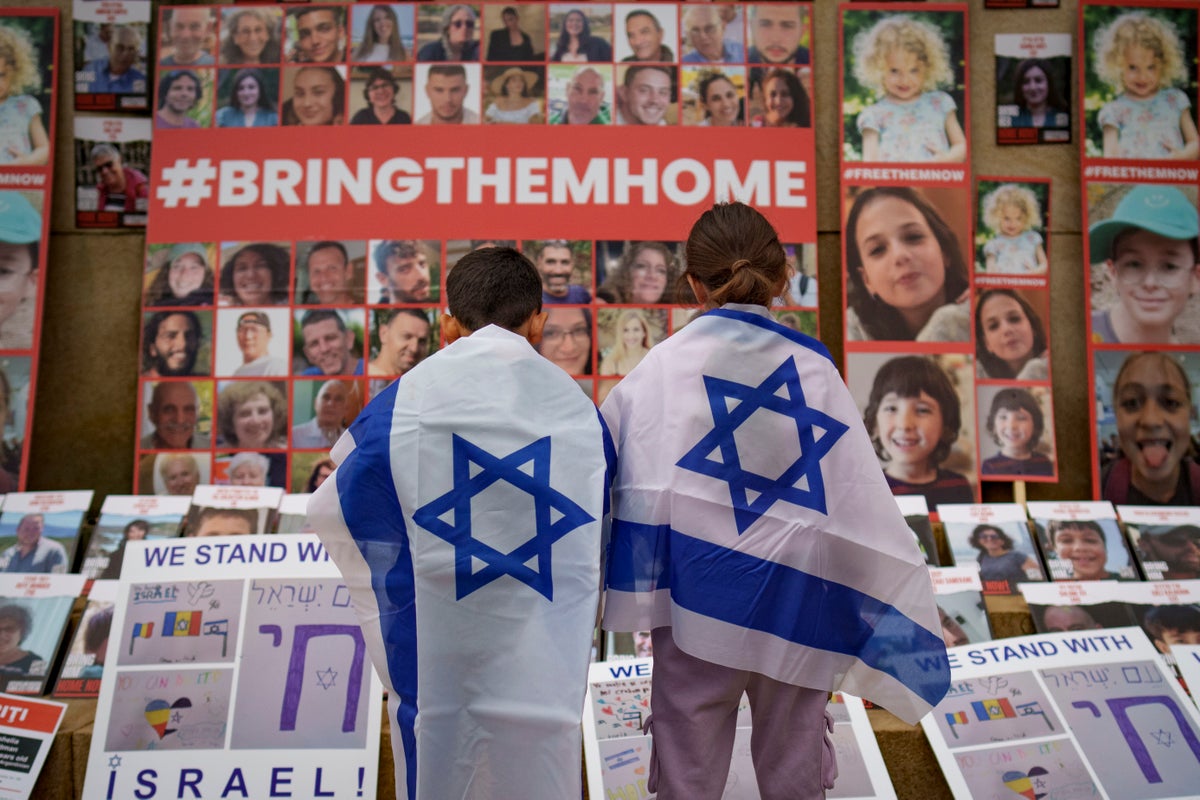
Israel’s ambassador to the US has expressed hope that Hamas could release a significant number of hostages held in Gaza “in the coming days”, amid reports of talks that are also aimed at securing a days-long humanitarian pause in the conflict.
Declining to go into details of the “very sensitive” negotiations to free some of the estimated 240 captives seized in Hamas’s brutal cross-border incursion into Israel on 7 October, Michael Herzog told ABC’s This Week: “They are very serious efforts, and I’m hopeful we can have a deal in the coming days.”
Echoing the Israeli diplomat’s positive sentiments, White House deputy national security adviser Jon Finer said on Sunday that he believed a deal to free a considerable number of hostages could be closer than ever.
“What I can say at this point is that some of the outstanding areas of disagreement, in a very complicated, very sensitive negotiation, have been narrowed,” Mr Finer told NBC’s Meet the Press programme.
A premature baby being fed after being transferred from al-Shifa Hospital— (Abed Rahim Khatib/Anadolu/Getty)
But he warned: “Nothing is agreed until everything is agreed. Sensitive negotiations like this can fall apart at the last minute.”
On Sunday, The Washington Post reported that a deal was imminent in which all parties would freeze combat operations for at least five days while 50 or more hostages were released in groups every 24 hours. However, US and Israeli officials denied the report.
It came as the World Health Organisation (WHO) chief said that 31 “very sick” premature babies had been safely transferred from al-Shifa Hospital – Gaza’s largest – more than a week after it was encircled and attacked by Israeli troops, who insist the hospital lies above an underground Hamas headquarters.
On Sunday night, the Israeli military published a video that it said showed a 55-metre fortified tunnel dug under the hospital.
While hundreds of patients and staff had already fled the hospital as food, water and medical supplies ran out, with all but five doctors remaining there on Saturday, international alarm had been growing over the fate of premature babies who had been left without incubators following a power blackout.
The premature babies were transferred to the United Arab Emirates Hospital in Rafah— (Abed Rahim Khatib/Anadolu/Getty)
WHO chief Tedros Adhanom Ghebreyesus said the babies were evacuated in ambulances of the Palestinian Red Crescent to a hospital in the city of Rafah in southern Gaza, where they were receiving urgent care before being moved to Egypt.
The babies were suffering from dehydration, vomiting and hypothermia, and some had sepsis because they hadn’t received any medication. They had not been in “suitable conditions for them to stay alive”, said Mohamed Zaqout, the director of hospitals in Hamas-run Gaza.
A team of UN officials who visited the hospital on Saturday described it as a “death zone” and said 291 patients were still there, including the now rescued babies, trauma patients with severely infected wounds, and others with spinal injuries who were unable to move.
Palestinians search for casualties at the site of Israeli strikes on houses in Jabliya— (Reuters/Fadi Alwhidi)
The WHO team reported signs of gunfire and shelling and a mass grave at al-Shifa’s entrance, and said they were making plans for the immediate evacuation of the remaining patients and staff, as evidenced by the babies’ departure on Sunday.
According to the health ministry, whose figures are deemed credible by the UN, more than 12,000 people have been killed in Gaza – 5,000 of them children – since Israel’s intense retaliatory bombardment and subsequent invasion of the densely populated strip began on 7 October.
Witnesses reported heavy fighting overnight between Hamas gunmen and Israeli forces trying to advance into Jabaliya, Gaza’s largest refugee camp, where scores of people were feared to have been killed by Saturday’s alleged Israeli airstrike at a school where thousands were sheltering.
An opening to a tunnel that, according to Israel's military, was used by Palestinian militants under Al Shifa hospital— (via REUTERS)
Israel’s military said on social media on Sunday that residents of several Jabaliya neighbourhoods should evacuate towards south Gaza “to preserve your safety”, and that it would pause military action from 10am to 2pm.
Once the pause had expired, 11 Palestinians were killed by an Israeli airstrike on a house in Jabaliya, Gaza’s health ministry said.
Further south, Palestinian medics said 31 people were killed, including two local journalists, in airstrikes targeting houses in the Bureij and Nusseirat refugee camps on Saturday night. Another airstrike killed a woman and her child overnight in the southern city of Khan Younis, they said.
UN secretary general Antonio Guterres said on Sunday that he was “deeply shocked” that two UN schools had been struck in less than 24 hours in Gaza, killing and injuring dozens of people “as they were seeking safety in United Nations premises”.







